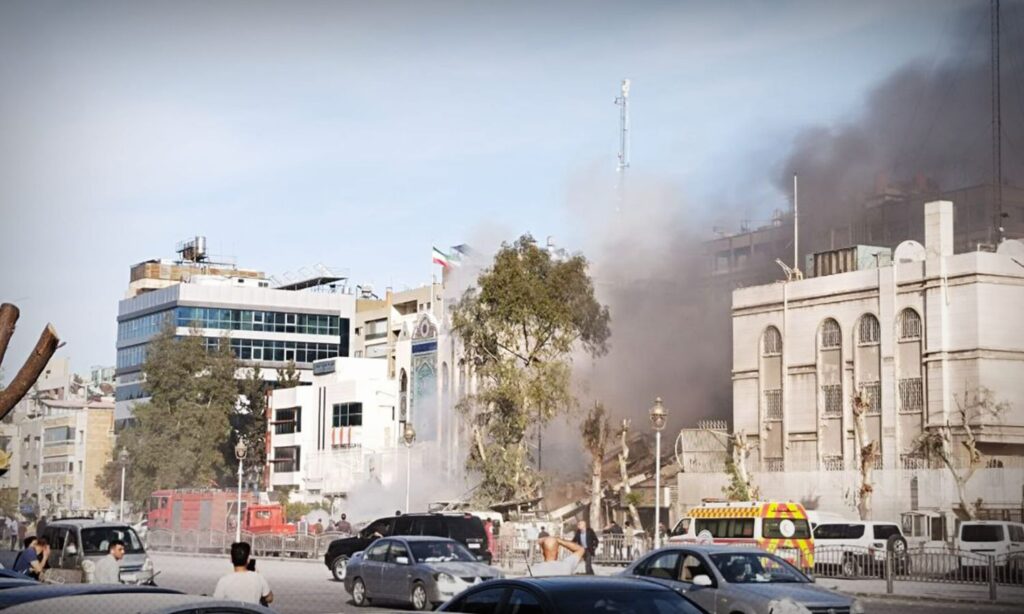A military headquarters, an Iranian consulate, or a residential building in which the Iranian consul or ambassador resides? Many questions have been raised in the past few hours, after the Israeli Air Force bombed a building adjacent to the Iranian embassy in Damascus, resulting in its complete destruction and the death of Iranian military leaders.
The targeted building is located on Mezzeh highway in central Damascus, adjacent to the Iranian embassy building. Next to it is Al-Razi Hospital, the Canadian embassy, and opposite it are the telecommunications companies “Syriatel” and “MTN”.
“Military headquarters, not consulate”
Iranian state television reported that the bombed building was the headquarters of the Iranian consulate and the residence of the Iranian ambassador in Syria, and that the Iranian flag had been hoisted on this targeted building.
Similarly, Syrian state media endorsed the Iranian narrative, as the Syrian Arab News Agency (SANA) reported that Israel bombed the Iranian consulate building in Damascus at five o’clock in the evening on Monday, April 1, leading to the building’s complete destruction.
On the other hand, the spokesperson for the Israeli military, Admiral Daniel Hagari, said that Tel Aviv believes that the target hit in Damascus was a “military building of the Quds Force,” which is a unit of the Iranian Revolutionary Guard Corps (IRGC) responsible for foreign operations.
Hagari added to CNN, “According to our intelligence, this is no consulate and this is no embassy. This is a military building of Quds forces disguised as a civilian building in Damascus.”
The Israeli Intelli Times blog quoted Israeli intelligence sources as saying that “the property had not been identified as a consulate like other Iranian diplomatic properties in Latakia and Aleppo, which had been officially identified in maps or in publications of the Iranian Ministry of Foreign Affairs as consulates.”
Intelli Times, on its page in the “X” application yesterday, April 2, reported that the targeted site was used as a headquarters to host staff from the Iranian Revolutionary Guard Corps.
Intelligence sources reject the claim that the attack near the Iranian embassy in Damascus was against a diplomatic structure. According to the sources, the property was not identified as a consulate like other Iranian diplomatic properties in Latakia and Aleppo that were…
— אינטלי טיימס – إنتل تايمز – Intelli Times (@IntelliTimes) April 2, 2024
Syrian families reside in the targeted building
A source close to one of the families living in the targeted building confirmed to Enab Baladi that “the building consists of four floors, the first floor of which is occupied by the Iranians,” explaining that the building includes a private elevator directly connected to the neighboring Iranian embassy building, and that there are two underground floors used by the embassy, according to another source from the area’s residents for Enab Baladi.
The same source added that “there are also Iranians living on the second floor, while two Syrian families live on the third and fourth floors of the targeted building, and Iran had tried to buy them out or rent them, but their owners refused to sell them.”
Who was inside the building?
The Israeli bombing of the Iranian consulate led to the death of 13 people, seven of them are members of the Iranian Revolutionary Guard Corps, and six are Syrians, according to the official television in Tehran.
Among the deceased in the attack were Major General Mohammad Reza Zahedi, responsible for Lebanon and Syria in the Quds Force of the Revolutionary Guard Corps, and General Mohammad Hadi Haj Rahimi.
The source close to one of the families residing in the building informed Enab Baladi that during the moment of the bombing, one of the two Syrian families residing in the building was outside, while the other was inside and an elderly woman and her grandson died.
The New York Times reported, quoting Israeli officials, that the bombing targeted a secret meeting inside the consulate for Iranian intelligence officials and leaders of the Palestinian Islamic Jihad movement and was scheduled to discuss the war in Gaza, but the targeting resulted in the killing of figures from the Revolutionary Guard Corps only, indicating that the Islamic Jihad leaders had not yet arrived at the building.
In turn, the Israeli Channel 14 reported that it was also supposed to be that Mohammad Reza Falah Zadeh, deputy commander of the Quds Force, went to this meeting inside the consulate, but he arrived late and escaped assassination.
The Iranian Kayhan London website also said that the Iranian ambassador to Syria was not inside the targeted building or within the adjacent embassy building, but was on holiday in Tehran.
Following the Israeli bombing of the Iranian consulate, the Iranian ambassador in Syria, Hussein Akbari, claimed that he was at his place of work inside the embassy at the time of the bombing and saw from his room that the building was completely damaged, while Al-Alam channel claimed that the Iranian ambassador, his family, and members of the diplomatic corps are safe.
The Syrian Foreign Minister, Faisal Mekdad, visited the target site, met the Iranian ambassador, and made a call with his Iranian counterpart, expressing his condolences and unity of stance between the two sides.
Iranian President Ebrahim Raisi condemned the Israeli attack on his country’s consulate building in Damascus, saying that Iran would punish Israel.
Axios news website reported, citing a “senior” unnamed Israeli official, that the Israeli military is on high alert in anticipation of retaliatory attacks from militias allied with Iran in Syria.
The American website added that Israeli intelligence had been following Iranian General Mohammad Reza Zahedi for a long time, who was responsible for arming and coordinating with Hezbollah and other militias loyal to Iran in Lebanon and Syria.

